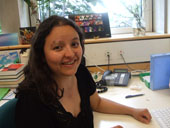Pilar Junier

Full professor
Office A217
Phone: +41 32 718 22 44

My scientific career has always focused on the interaction between microorganisms and their environment. Since I became director of the Laboratory of Microbiology at the University of Neuchâtel, I decided to develop a scientific agenda based on niche topics in microbial ecology. The rationale for this was to maximize a scientific impact in a highly competitive field. In the following paragraphs I will ennumerate these topics and the key achievements of my group.
Bacteria-fungi interactions (BFI)
Bacteria and fungi are recognized as key engines of biological processes in all terrestrial environments. However, until recently, their contribution to ecosystem processes was investigated for each group separately. Therefore, the aim of our work in the field is to investigate the emerging properties brought upon interactions. Among our key contributions to the field I would like to highlight:
- Relating the production of a long-term carbon storage stock to the microbial logistics of oxalate degradation in soils.
- The discovery of a novel mutualistic interaction consisting in the farming of bacteria by soil fungi and its link to organic nitrogen cycling.
- The development and proof-testing of novel methods to investigate BFI in situ, including expanding the prodution of these devices to additive printing.
- The investigation of the fungal microbiome composed of both exo and endobacteria associated to fungal hyphae.
- The design of tailored consortia for mineral formation and nutrient mobilization.
Biogenic mineral formation
In my past research as a post-doctoral fellow I demonstrated the role of bacterial endospores on the biogenic formation of uranium minerals and its potential for the bioremediation of heavy metals. Later on, I continued this research in collaboration with Prof. Edith Joseph at the University of Neuchatel, to investigated the potential of using microorganisms in the safeguarding of cultural heritage. This research has led to the formulation of a ready to use kit for the conservation of copper-based alloys and more recently, to the proof-of-concept of the use of bacterial iron reduction for the stabilization of archaeological iron. More recently, together with my Maître Assistante, Dr. Saskia Bindschedler, we have pursued this line of research in the field of urban mining for the biological recovery of metals. This research will become the main independent research line of Dr. Bindschedler in her future career.
Endospore-forming and spore-forming bacteria
During previous SNF-funded projects, we have set to investigate the diversity and ecological relevance of (endo)spore-formers in natural habitats. To achieve this, we have developed new approaches to study the diversity of this group in environmental samples. This included the identification of genetic markers; the development of a specific quantitative PCR approach and tailored DNA extraction method for endospores, and new bioinformatic tools to analyze the genomic datasets generated. The combination of these methods has been used to show a correlation between prevalence of endospore-formers and elevated heavy and trace metals content in sediments associated to the release of treated wastewater. In addition, we have documented a correlation between community structure in sediment and the paleolimnological history of Lake Geneva, including the traceability of antibiotic resistance genes. We have also carried out a general survey of endospore-formers relative in poly-extreme environments. The molecular study has been complemented by an effort to culture and characterize new spore-forming strains. Future research aims at understanding of the mechanisms of dormancy beyond endospore-forming Firmicutes, inlcuding the development of new methodological genomic tools for spore-formers.
Formation
Novembre 2009 - présent: Professeure assistante, Université de Neuchâtel, Suisse
Juillet 2006 - Octobre 2009: Post-doc, école polytechnique fédérale de Lausanne (EPFL), Lausanne, Suisse.
Novembre 2004 - Mai 2006 : Post-doc, Max-Planck-Institute for Limnology, Ploen, Allemagne.
2001-2004 : Thèse de doctorat en Sciences avec mention en Microbiologie, Université du Chili, Santiago du Chili, Chili.
1995-2000 : Biologiste (équivalent master) avec accent sur la génétique, Université Nationale de Colombie, Bogotá, D.C., Colombie.
Enseignements
Bachelor de Biologie
- Bactériologie générale
- TP en microbiologie
Master Biogéosciences
- Bioaltération de mineraux
- Enzymologie et humification
- Rhizosphère
- Ecologie microbienne
- Géomicrobiologie
- TP méthodes d'écologie moléculaires et méthodes molécuaires approfondies

